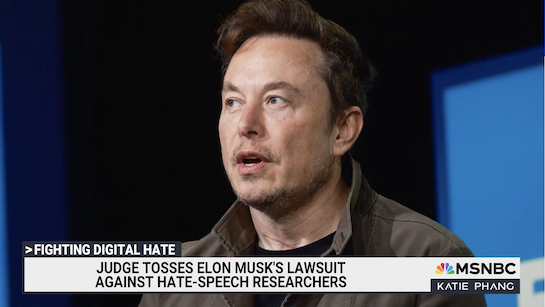The Media Research Center’s work as Elon Musk’s PR division has slowed down of late — probably because there isn’t much good news to report, particularly on the legal front as his attempts to censor his critics keep getting shut down in court.
First up: Musk had to give a deposition in a defamation lawsuit against him filed by him by a Jewish college student whom Musk had claimed was a neo-Nazi (or a false-flag federal agent pretending to be one). Despite demanding that the deposition not be made public, it was anyway — and it was soon clear why he didn’t want people to see it. He played dumb about the lawsuit, then insisted he was merely speculating about the identification of the person in the picture. Meanwhile, Musk’s lawyer not only was kind of a jerk during the deposition, the student’s lawyers have asked the court to sanction him because he’s doing legal work in a Texas court for the lawsuit despite not being licensed in the state and not having obtained the court’s permission to work there. Musk’s attempt to get the lawsuit dismissed also failed.
Meanwhile, a court tossed Musk’s lawsuit against the Center for Countering Digital Hate — whom the MRC loves to maliciously smear as “digital brownshirts” — because it exposed the proliferation of neo-Nazis, white supremacists and other spreading hate speech on Twitter/X. The judge pointed out that Musk’s lawsuit was about “punishing the Defendants for their speech” and specifically to “punish CCDH for CCDH publications that criticized X Corp. — and perhaps in order to dissuade others who might wish to engage in such criticism.” CCDH chairman Imran Ahmed said, “We hope this landmark ruling will embolden public-interest researchers everywhere to continue, and even intensify, their vital work of holding social media companies accountable for the hate and disinformation they host and the harm they cause.”
In a related lawsuit, Media Matters was able to get an injunction against Texas Attorney General Ken Paxton to stop him from rummaging through documents as part of a legal action thte state filed against it in an echo of Musk’s lawsuit against Media Matters for exposing how Twitter/X is placing ads next to offensive content and hate speech (a lawsuit the MRC curiously refuses to talk about). The judge pointed out that Media Matters’ investigative journalism and reporting “are core First Amendment activities,” and any “loss of First Amendment freedoms, for even minimal periods of time, unquestionably constitutes irreparable injury.”
And in a non-Twitter-related legal action, the Supreme Court rejected Musk’s request to end a settlement agreement with the Securities and Exchange Commission that requires him to have a lawyer or “Twitter sitter”) review his social media posts about Tesla to keep him from making fraudulent claims.
Meanwhile, Musk continues to make questionable legal decisions that the MRC has remained quiet about (aside from his attempt to defend the right of people to watch snuff videos). He has announced he will pay the legal expenses of Kulvinder Kaur Gill, a Canadian doctor who tried to sue various people who pointed out her false claims about COVID vaccines and otherwise disagreed with her. He also demanded that the Global Disinformation Index, which instructs advertisers how to avoid harmful content near their ads, be shut down because it flagged one website’s content as misinformation.
